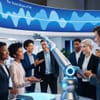We’re entering a new era of artificial intelligence—one that promises to reshape the way we work. After years of development in narrow AI, the third wave of AI is upon us, bringing with it the rise of "agentic AI." Unlike previous AI models that were designed to complete specific tasks, agentic AI systems are capable of making decisions and taking actions autonomously, learning from their environment, and adapting as needed. These advanced AI agents are poised to work alongside humans in ways that were previously unimaginable, acting not just as tools, but as partners in decision-making and problem-solving.
Agentic AI operates as an autonomous agent capable of performing complex tasks and making decisions on behalf of human users or organizations. Think of it as an intelligent assistant that doesn’t simply carry out instructions but anticipates needs, evaluates situations, and takes action independently. In practice, this means AI can analyze vast amounts of data, identify trends, and make real-time decisions without human intervention. It’s a leap forward from current AI applications, which often rely on humans to interpret results and take the next step.
This shift is expected to significantly enhance productivity across industries. For example, AI agents could handle time-consuming tasks like data entry or real-time decision-making in sectors like healthcare, logistics, or finance, freeing up human workers to focus on higher-level creative or strategic work. By taking over routine or complex functions, AI can reduce human error, streamline operations, and improve efficiency. In many cases, AI won’t replace jobs but rather augment them, providing support and enhancing decision-making capabilities for human workers.
However, with these advancements come new challenges. As AI takes on more responsibility, businesses will need to ensure that these systems are transparent, accountable, and aligned with ethical standards. There will also be concerns about trust—how do we ensure these AI agents are making decisions that are fair and in the best interest of employees and customers? As companies integrate agentic AI into their workflows, the need for proper training and collaboration between humans and machines will be critical for success.
The future of work will be defined by the collaboration between intelligent systems and human workers. As agentic AI becomes more prevalent, workplaces will shift toward a model where AI takes on complex tasks, allowing humans to focus on areas that require creativity, empathy, and judgment. While we’re still in the early stages, the rise of agentic AI promises to be a transformative force, changing how we approach work and innovation in ways we’re just beginning to understand.


